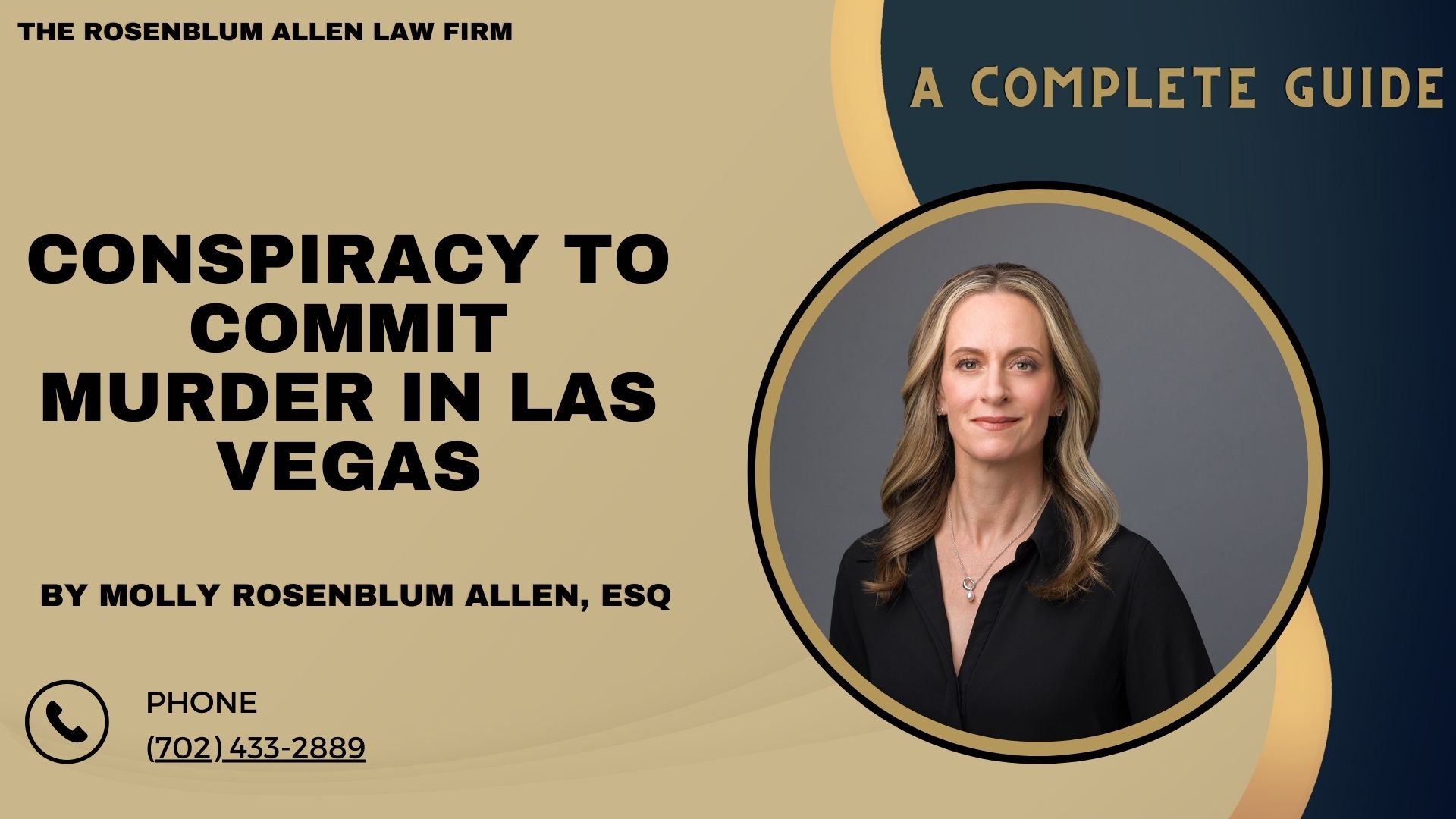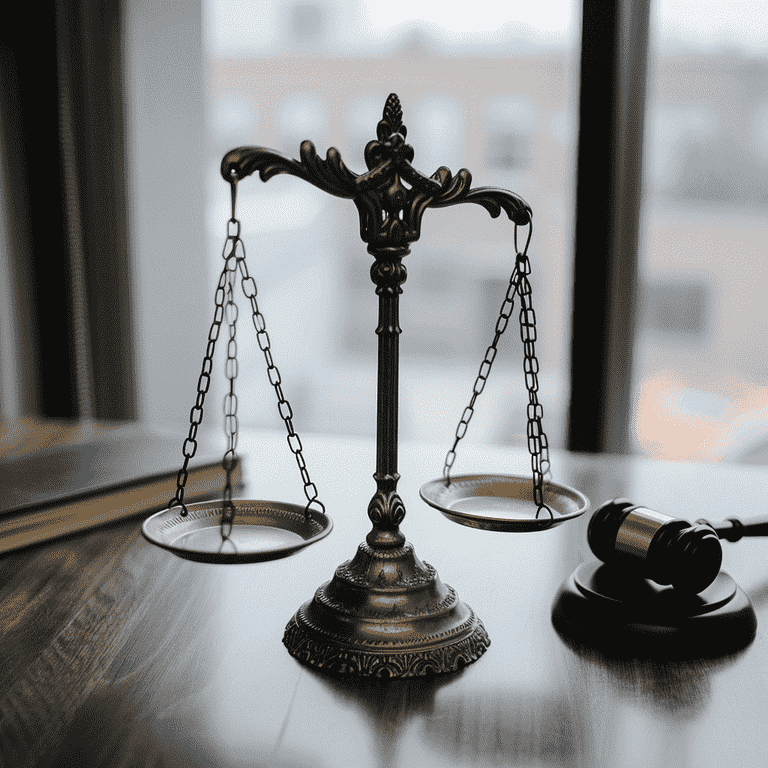Facing a charge as serious as conspiracy to commit murder in Las Vegas can feel like navigating a maze.
You’re doing it without a map. This guide aims to be that map. It will clarify Nevada law for the accused. It will provide direction through its complexities.
The situation is daunting. But, understanding the law can empower you.
It will help you to face the charges with a clearer mind.
In the neon glow of Las Vegas, the stakes are always high, especially about legal matters. Facing “conspiracy to commit murder” demands serious attention. This is due to the potential penalties. It’s also because of the complex legal definitions and implications. This guide aims to demystify the charge. It will explain its parts. It will offer insights into navigating the legal system. It will do so with the seriousness such a charge deserves.

 Understanding the Charge
Understanding the Charge
Definition of Conspiracy in Nevada Law
At its core, a conspiracy occurs when two or more persons agree to commit a crime. This definition holds in Nevada but with nuances specific to state law. Understanding these specifics is crucial for anyone facing these charges.
The legal requirement for an agreement: This does not need to be a formal pact but must be a mutual understanding to pursue an illegal act.
Intent and its role in conspiracy charges: Each party in the conspiracy must have the intent to further the criminal objective. It’s not just about planning but intending to execute those plans.
Specifics of “Conspiracy to Commit Murder”
Diving deeper, “conspiracy to commit murder” in Las Vegas has its own specifics. They are under the legal microscope.
Differentiating between conspiracy and the act of murder: It’s essential to understand that one can be charged with conspiracy without the murder being committed. The charge hinges on the agreement and intent to commit murder, not the murder itself.
How conspiracy to commit murder is charged in Las Vegas: Nevada law treats this charge with utmost seriousness, often equating the legal consequences to those of attempted murder, depending on the circumstances.

Legal Implications and Consequences
Facing a charge of conspiracy to commit murder has many potential consequences. Each one is more daunting than the last. Understanding these can help in preparing for the road ahead.
Potential Penalties for Conspiracy to Commit Murder in Las Vegas
Nevada’s legal system has a reputation for being rigorous. This is especially true for crimes of this size. The penalties are severe. They reflect how seriously the state views the intent to harm.
Overview of sentencing guidelines: Penalties can range from years to life in prison, depending on the nature of the conspiracy and any prior criminal history.
Factors influencing sentencing: The court considers several factors, including the defendant’s role in the conspiracy, the steps to commit the crime, and any mitigating or aggravating circumstances.
The Impact of a Conviction
The repercussions of a conviction extend beyond the courtroom and the prison cell. They seep into every facet of one’s life, profoundly reshaping the future.
Long-term legal consequences: Beyond imprisonment, a conviction can lead to the loss of certain civil rights, such as the right to vote or own firearms.
Social and employment implications: The stigma of a felony conviction can hinder employment opportunities, relationships, and social standing.
In navigating these turbulent waters, knowledge is your anchor. The first step is to understand the legal definitions. You must also know the implications and consequences of a conspiracy to commit murder charge in Las Vegas. This understanding is key to crafting a defense strategy that stands up to scrutiny. The road ahead may be hard. But, having info is the key to facing it with confidence.

Defense Strategies
Navigating a conspiracy to commit murder is like sailing stormy seas. It takes more than an excellent legal map; it needs a savvy captain at the helm. This section will explore the defense strategies to help turn the tide in your favor.
Common Defense Strategies Against Conspiracy Charges
Each conspiracy case is unique. But, specific defenses have worked in court. Understanding these can provide a beacon of hope.
Challenging the existence of an agreement: If the prosecution can’t prove that a mutual agreement to commit murder existed, the foundation of the conspiracy charge may crumble.
Disputing intent to commit the crime: Proving that there was no intent to follow through with the murder can significantly weaken the prosecution’s case.
The Role of Evidence in Conspiracy Cases
In conspiracy charges, evidence is key. It often reveals the truth or casts doubt.
The importance of circumstantial evidence: In many conspiracy cases, direct evidence is scarce, making circumstantial evidence crucial. Understanding its role and how to counter it is critical.
Legal standards for admissible evidence: Not all evidence is created equal. Knowing what evidence can legally be presented in court can help formulate a firm defense against scrutiny.
Importance of Legal Representation
In the legal world, a skilled defense attorney is your champion. They wield expertise like a sword. They use it to defend your rights and future.
How a defense attorney can help: From navigating complex legal waters to crafting a compelling defense strategy, a seasoned attorney is indispensable.
Building a defense case involves gathering evidence, interviewing witnesses, and challenging the prosecution’s case at every turn.

Navigating the Legal Process
The legal process is like a journey through a dense forest. It can be confusing and overwhelming. But with the right guide, you can find your way through.
Initial Steps After Being Charged
The moments after being charged are critical. They can set the tone for the entire legal battle that lies ahead.
Understanding your rights: Knowing your rights can protect you from making statements or decisions that could adversely affect your case.
The importance of not incriminating yourself: Anything you say can be used against you in court. Remaining silent until you can speak with an attorney is often the wisest action.
Pre-Trial Procedures in Las Vegas
Before the trial even begins, several steps shape the battlefield.
The role of preliminary hearings: The prosecution must show enough evidence to justify the charges. It’s a critical opportunity for the defense to challenge the strength of the case.
The discovery process and its significance: Discovery allows the defense to see the evidence against you, offering the chance to find weaknesses in the prosecution’s case.
Trial Process for Conspiracy to Commit Murder Charges
In the main event of the trial, participants test strategies and determine fates.
Jury selection and its impact on the case: Selecting the right jury is crucial, as these individuals ultimately decide your fate.
Key stages of a trial, from opening statements to the verdict: Understanding each stage of the trial process can demystify what often feels like a daunting and complex ordeal.
Starting the journey through the legal system is hard. It’s especially hard when you face charges as serious as conspiracy to commit murder. It can feel like navigating through a storm. But, with the right preparation, understanding, and legal help, you can chart a path to a better future. Remember, in the legal world, knowledge is not just power—it’s protection.

Post-Trial Considerations
After the dust of the trial settles, the journey might not be over. You may be facing a conviction. Or, you may be navigating the aftermath of a trial. Understanding what comes next is crucial for moving forward.
Options After a Conviction
The gavel’s final fall does not necessarily mark the end of the road. There are avenues available that might change the course of your future.
The appeals process: This is your opportunity to challenge the conviction or sentence if legal errors affect the outcome of your trial. It’s a path worth exploring with your attorney.
Seeking sentence reduction or probation: Under certain circumstances, it may be possible to argue for a reduced sentence or probation, especially if new evidence comes to light or if mitigating factors were not previously considered.
Expungement and Record Sealing
A conviction can be like a shadow, following you long after serving your sentence. However, there might be a light at the end of the tunnel.
Eligibility criteria for expungement in Nevada: Expungement laws vary, but in Nevada, specific criteria must be met before a conviction can be expunged from your record. This can include the type of crime. It can also include a particular time and if you’ve obeyed your sentence’s terms.
The process and benefits of record sealing: Sealing your record can open doors that a conviction has closed, such as employment opportunities, housing, and more. It’s a process that requires navigating legal steps. But, the benefits can be life-changing.
Why You Have Not Hired a Felony Defense Attorney Yet
Watch this short video to take the next big step toward defending your rights against a felony charge.

Breaking It All Down
Facing a charge of conspiracy to commit murder in Las Vegas is harrowing. It can test the limits of your resilience and hope. Understanding the charge and its implications is the first step. Next is navigating the legal system and exploring post-trial options. Each step requires strength, knowledge, and legal support.
Remember, while the path may be fraught with challenges, you’re not walking it alone. Knowledge is a beacon in the dark. With the right guidance, you can navigate the complexity of the legal system. An experienced defense attorney can be your compass. They offer direction when the way seems unclear. They also advocate for your rights and future at every turn.
Ultimately, it’s not just about facing a charge. It’s about meeting it with the needed understanding, prep, and support. These are necessary to seek the best outcome. The road may be long and hard. But, hope and help are there for those who seek it.

More Frequently Asked Questions
Can I be charged with conspiracy to commit murder if no one was hurt?
Yes, authorities can charge you with conspiracy to commit murder even if you did not harm anyone. The charge is not based on the completion of the act but on the agreement and intent to commit murder.
What is the difference between being charged with murder and conspiracy to commit murder?
Being charged with murder requires that someone has committed the act of killing. Conspiracy to commit murder is different. It focuses on the agreement and planning to commit murder. Whether someone carried out the act does not determine it.
How can I prove my innocence if I’m falsely accused of conspiracy to commit murder?
Proving innocence can involve showing the lack of agreement. It can involve showing the lack of intent to commit murder. It also involves providing alibis. And, showing a lack of knowledge or involvement in the plan. Or, undermining the credibility of the prosecution’s evidence.
Are there any specific defenses that are more effective in conspiracy cases?
Defenses vary by case. But, some effective strategies include showing no agreement. You can prove lack of intent. Or, you can show that the discussions were not severe. Or, or someone took them out of context.
What role do plea bargains play in conspiracy to commit murder charges?
Plea bargains are important. They let the accused plead guilty to a lesser charge in exchange for a reduced sentence. This is often considered based on the evidence’s strength and the case’s specifics.
How can character witnesses impact my case?
Character witnesses can help your case. They can testify about your character, behavior, and typical conduct. This could cast doubt on the prosecution’s claim that you would conspire to commit murder.
What happens if new evidence is found after my conviction?
New evidence can lead to an appeal or a request for a new trial. This is especially true. The evidence could have greatly changed the trial’s outcome.
How long does the legal process for a conspiracy to commit murder charge typically take in Las Vegas?
The process’s duration can vary a lot. It depends on the case’s complexity, the evidence amount, and pre-trial motions. Also, it depends on the court’s schedule. It can take anywhere from several months to a few years.
Can the government seize my assets if I’m convicted of conspiracy to commit murder?
In some cases, the government may seize assets linked to crime. This includes conspiracy to commit murder. If people believe that the assets are proceeds of crime, this is especially true.
Is it possible to have a conspiracy to commit murder charge dropped?
Yes, authorities can drop charges if they don’t have enough evidence. If the court rules crucial evidence inadmissible, they can drop it. Or if the prosecution believes they cannot prove the case.
What should I do if I suspect I’m being investigated for conspiracy to commit murder?
If you are under investigation, you must stay silent and seek a lawyer right away. Having an attorney can help protect your rights by using anything you say against you.
How does the jury decide on a verdict in conspiracy to commit murder cases?
The jury examines the evidence from the trial. This includes the alleged agreement, intent, and actions toward the crime. They must decide if the prosecution has proven the case beyond a reasonable doubt.

Glossary
Conspiracy: An agreement between two or more persons to commit a criminal act. In the context of this guide, it refers specifically to plans made to commit murder.
Intent: A key element in conspiracy charges is the determination to carry out a criminal act. It must be proven that all parties involved intended to commit the crime discussed.
Preliminary Hearing: A pre-trial proceeding where the prosecution must demonstrate enough evidence to charge the defendant with the crime.
Discovery Process: A phase in the legal process where both the defense and the prosecution exchange information and evidence relevant to the case.
Jury Selection: The process of choosing jurors who will decide the outcome of a trial. This involves questioning potential jurors to ensure they can judge the case fairly.
Direct Evidence: Evidence directly proves a fact, such as eyewitness testimony or a confession.
Circumstantial Evidence: Evidence that requires an inference to connect it to a conclusion of fact, such as fingerprints or DNA evidence found at the crime scene.
Admissible Evidence: Evidence that can legally be presented to a jury in court. The judge determines this based on relevance, reliability, and legal principles.
Felony Conviction: A conviction for a serious crime, typically punishable by more than a year in prison. Conspiracy to commit murder is considered a felony.
Expungement: The legal process of deleting a conviction from public records and erasing it from the convicted person’s criminal history.
Record Sealing: Similar to expungement, this process restricts the accessibility of a criminal record, making it unavailable through state or federal repositories.
Appeals Process: The procedure for seeking a higher court’s review of a lower court’s decision, aiming to reverse or amend the decision due to legal errors that impacted the trial’s outcome.
Sentence Reduction: The process of seeking a lesser sentence than what was initially imposed, often through appeals or negotiation with the prosecution.
Probation: An alternative to imprisonment where the convicted person is allowed to remain in the community under specified conditions and the supervision of a probation officer.
Plea Bargain: An agreement between a defendant and the prosecution in which the defendant agrees to plead guilty to a lesser charge or one of multiple charges in exchange for a lighter sentence.

Additional Resources for You
As you navigate through the complexities of facing legal charges, remember that you’re not alone. Our lead attorney, Molly Rosenblum, Esq., has meticulously created a suite of resources to assist you in your time of need. Each resource is tailored to address specific areas of criminal law, ensuring you have access to effective guidance and support.
For comprehensive Criminal Defense insights and representation, explore our dedicated section that covers a wide range of offenses: Criminal Defense Attorneys.
If you’re facing charges related to driving under the influence, our Las Vegas DUI Lawyer resource page offers crucial advice and defense strategies: Las Vegas DUI Lawyer.
Dealing with Domestic Violence accusations can be particularly challenging. Find specialized support here: Domestic Violence Lawyer Las Vegas.
Drug Possession charges require a nuanced defense approach. Our resource page details your options: Drug Possession Lawyer.
Facing Sex Crimes charges? Access specialized legal advice to navigate these sensitive cases: Sex Crimes Attorney.
If you’re involved in a CPS Defense case concerning child abuse and neglect, we provide effective legal representation: CPS Defense Attorney.
For those charged with Misdemeanors, understanding the potential impacts and defense strategies is crucial: Misdemeanor Lawyer.
Las Vegas Warrant Defense is essential for resolving outstanding warrants and avoiding further legal complications: Las Vegas Warrant Defense Attorney.
Violating probation terms can have severe consequences. Learn about your options here: Las Vegas Probation Violation Attorney.
Theft Crime Defense requires a strategic defense to protect your rights and future: Theft Crime Defense Lawyer.
For those accused of Kidnapping, our lawyers provide aggressive representation: Kidnapping Lawyers.
Juvenile Defense involves unique challenges and considerations. Our juvenile defense lawyers are here to help: Juvenile Defense Lawyers.
In cases involving Firearms Laws in Las Vegas, understanding your rights is paramount: Firearms Lawyer Las Vegas.
Molly Rosenblum Allen, Esq., and the team at The Rosenblum Allen Law Firm are dedicated to providing you with the legal support and guidance you need, no matter the complexity of your case. Each of these resources is designed to help you understand your rights, the legal process, and the defenses available to you.

Outside Resources for You
To further assist you in navigating the complexities of your legal situation, here are seven offsite resources that you may find useful. These resources provide a wealth of information on legal advice, support services, and educational content related to criminal law and defense strategies.
American Bar Association (ABA): A premier national organization that offers extensive resources on legal topics, including criminal defense and public education on the law. Visit ABA
National Association of Criminal Defense Lawyers (NACDL): An organization dedicated to ensuring justice and due process for persons accused of crime or misconduct. Visit NACDL
ACLU of Nevada: Works in courts, legislatures, and communities to defend and preserve individual rights and liberties guaranteed by the Constitution and laws of the United States. Visit ACLU of Nevada
FindLaw: Offers a comprehensive set of legal resources for individuals and businesses, including articles on criminal law and the legal process. Visit FindLaw
Justia: Provides free case law, codes, regulations, and legal information for lawyers, business, students, and consumers. Visit Justia
Avvo: Offers a Q&A forum where you can ask legal questions and receive answers from lawyers, as well as a directory to find lawyers near you. Visit Avvo
National Legal Aid & Defender Association (NLADA): A nonprofit organization that provides advocacy, guidance, and resources to ensure fair justice for all Americans, focusing on public defense and legal aid. Visit NLADA

A Special Message from Our Lead Attorney, Molly Rosenblum Allen, Esq

Dear Reader,
Thank you sincerely for taking the time to engage with our resources. I hope you found the info insightful and helpful. I know this is a tough time.
The Rosenblum Allen Law Firm commits to providing legal representation. We also offer the guidance and support you need to navigate the complexities of the legal system. We aim to ensure that you are fully informed. We will help you prepare to face any legal challenges.
I recognize the importance of personalized legal advice. I invite you to schedule a free consultation with our team. This will help us understand your situation better. Then, we can discuss how we can support you going forward.
Please call us at (702) 433-2889 to schedule your consultation. We are here to help you every step of the way.
Warmest regards,
Molly Rosenblum Allen, Esq.





